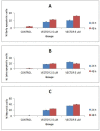Novel Approach Using shRNA of IQGAP1 for Colon Cancer Therapy: HCT116 as a Surrogate Model Colorectal Carcinoma
- PMID: 35901346
- PMCID: PMC9727335
- DOI: 10.31557/APJCP.2022.23.7.2387
Novel Approach Using shRNA of IQGAP1 for Colon Cancer Therapy: HCT116 as a Surrogate Model Colorectal Carcinoma
Abstract
Background: Colorectal carcinoma (CRC) represents life-threatening problems worldwide. IQ motif containing GTPase activating protein 1 (IQGAP1) is acting as oncogenesis regulators. RNAi is proposed as promising cancer therapeutics.
Objective: The objective of this work to explore the consequences of the IQGAP1 silence as a goal for treating CRC using the HCT166 cells as a model for human colon cancer.
Methods: RNAi technology was used to design a short specific sequence of RNA (shRNA) to silence the IQGAP1 oncogene. The impact of IQGAP1 silencing on IQGAPs, Ras, IL-8, and TRAIL was investigated. Furthermore, the effect of IQGAP1 silencing on cell viability, proliferation, apoptosis, and invasive capacity was investigated.
Results: The present results revealed that IQGAP1 shRNA-treated HCT166 cells showed no invasive capacity compared to the control cells. The silencing of IQGAP1 induced remarkable downregulation of IQGAP1, RAS (H&K), IL-8, CXCR1, CXCR2, NF-kB, BCL-2, and apoptosis of HCT166 cells. On the contrary, IQGAP2, IQGAP3, DR4, DR5, CASP-3, and BAX genes were significantly up-regulated.
Conclusion: The IQGAP1 regulates the expression of IQGAPs, Ras, IL-8 receptors, and the apoptotic network. Therefore, the silence of IQGAP1 is a promising strategy for colon cancer therapy.
Keywords: Apoptosis; Cell migration; Colon cancer; IQGAP1; shRNA.
Conflict of interest statement
The authors declared no potential conflicts of interest
Figures





Similar articles
-
IQGAP1 gene silencing induces apoptosis and decreases the invasive capacity of human hepatocellular carcinoma cells.Tumour Biol. 2016 Oct;37(10):13927-13939. doi: 10.1007/s13277-016-5283-8. Epub 2016 Aug 3. Tumour Biol. 2016. PMID: 27488117
-
Inhibition of induced-hepatic cancer in vivo through IQGAP1-shRNA gene therapy and modulation of TRAIL-induced apoptosis pathway.Front Oncol. 2022 Oct 5;12:998247. doi: 10.3389/fonc.2022.998247. eCollection 2022. Front Oncol. 2022. PMID: 36276098 Free PMC article.
-
miR‑124 inhibits cell growth through targeting IQGAP1 in colorectal cancer.Mol Med Rep. 2018 Dec;18(6):5270-5278. doi: 10.3892/mmr.2018.9518. Epub 2018 Sep 27. Mol Med Rep. 2018. PMID: 30272357
-
IQGAPs in cancer: a family of scaffold proteins underlying tumorigenesis.FEBS Lett. 2009 Jun 18;583(12):1817-24. doi: 10.1016/j.febslet.2009.05.007. Epub 2009 May 9. FEBS Lett. 2009. PMID: 19433088 Free PMC article. Review.
-
IQGAPs choreograph cellular signaling from the membrane to the nucleus.Trends Cell Biol. 2015 Mar;25(3):171-84. doi: 10.1016/j.tcb.2014.12.005. Epub 2015 Jan 21. Trends Cell Biol. 2015. PMID: 25618329 Free PMC article. Review.
References
-
- Dong P, Nabeshima K, Nishimura N. Overexpression and diffuse expression pattern of IQGAP1 at invasion fronts are independent prognostic parameters in ovarian carcinomas. Cancer Lett. 2006;243:120–12. - PubMed
MeSH terms
Substances
LinkOut - more resources
Full Text Sources
Medical
Research Materials
Miscellaneous

